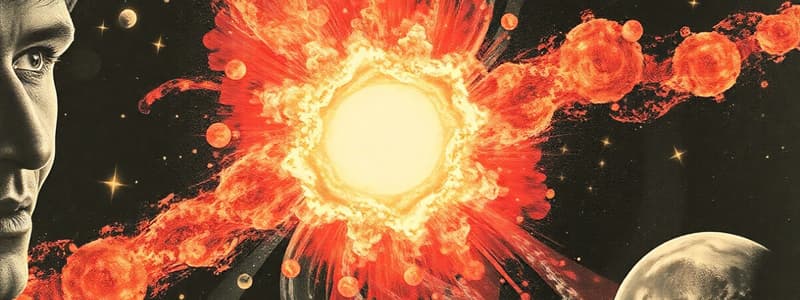Podcast
Questions and Answers
What does the term 'Big Bang' refer to?
What does the term 'Big Bang' refer to?
- The beginning of the universe (correct)
- The birth of stars
- The end of the universe
- The formation of Earth
The universe has stopped expanding since the Big Bang.
The universe has stopped expanding since the Big Bang.
False (B)
Approximately how many years ago did the Big Bang occur?
Approximately how many years ago did the Big Bang occur?
13.8 billion years
The first stars were formed from clumped atoms primarily of __________ and __________.
The first stars were formed from clumped atoms primarily of __________ and __________.
Match the following events with their descriptions:
Match the following events with their descriptions:
What significant event occurred in the first microseconds after the Big Bang?
What significant event occurred in the first microseconds after the Big Bang?
Quarks combined to form protons and neutrons during the next three minutes after the Big Bang.
Quarks combined to form protons and neutrons during the next three minutes after the Big Bang.
What are some of the heavy elements released into space by exploding stars?
What are some of the heavy elements released into space by exploding stars?
Scientists use the __________ to study the aftereffects of the Big Bang.
Scientists use the __________ to study the aftereffects of the Big Bang.
Which theory proposes that our universe may be one of many?
Which theory proposes that our universe may be one of many?
Flashcards
Big Bang
Big Bang
The beginning of the universe, where space, time, matter, and energy appeared and expanded rapidly outward.
Singularity
Singularity
A single point of extreme density and heat that is believed to have existed before the Big Bang.
Universal Expansion
Universal Expansion
The continuous outward movement of galaxies and other celestial objects, observed as evidence of the Big Bang.
Inflation
Inflation
Signup and view all the flashcards
Physical Forces
Physical Forces
Signup and view all the flashcards
Quarks
Quarks
Signup and view all the flashcards
Birth of Stars
Birth of Stars
Signup and view all the flashcards
WMAP (Wilkinson Microwave Anisotropy Probe)
WMAP (Wilkinson Microwave Anisotropy Probe)
Signup and view all the flashcards
Nucleosynthesis
Nucleosynthesis
Signup and view all the flashcards
Birth of Earth
Birth of Earth
Signup and view all the flashcards
Study Notes
The Big Bang
- The Big Bang is the name given to the beginning of the universe.
- Space, time, matter, and energy all emerged at this instant.
- The universe expanded outwards at incredible speeds.
- Astronomers observe the universe continually expanding, implying a starting point.
- The expansion suggests a time-like event: the Big Bang about 13.8 billion years ago.
The Big Bang's Early Stages
- The initial universe consisted of a single point known as a singularity.
- This point was extremely dense, hot, and contained all matter.
- The origin and existence of the singularity are still not fully understood.
- The Big Bang is not believed to have been a loud explosion, but an expansion from an infinitely small point.
- This expansion created space, time, and matter.
The First Microseconds
- The first fraction of a second after the Big Bang involved rapid changes.
- Basic forces like gravity emerged during this period.
- A superfast expansion, known as inflation, caused the universe to grow rapidly.
- The size of the early universe grew to approximately the size of a grapefruit.
- Quarks are the smallest subatomic particles formed in this phase.
Three Minutes Later
- During this phase, the universe cooled significantly.
- Quarks joined together to form protons and neutrons.
- The universe became a hot, dense soup of particles.
- These particles eventually combined to form simple atoms.
Two Hundred Million Years Later
- Atoms combined into gases.
- These gases, primarily hydrogen and helium, clumped together.
- Gravity pulled these gas clouds together, leading to the formation of the first stars.
- The early universe started forming galaxies.
- These galaxies included smaller structures that often collided and merged.
Tools Used to Study the Big Bang
- The Wilkinson Microwave Anisotropy Probe (WMAP) is a space telescope.
- WMAP studied heat patterns left over from the Big Bang.
- These observations help create a "map" of the early universe.
- This map shows the universe as it was 375,000 years after the Big Bang.
The Birth of Earth
- The first stars exploded as supernovas, releasing energy.
- These events dispersed heavier elements into space.
- These elements formed new stars and planets.
- Earth formed about 4.5 billion years ago within the Milky Way galaxy.
Studying That Suits You
Use AI to generate personalized quizzes and flashcards to suit your learning preferences.
Description
Explore the fascinating concepts surrounding the Big Bang, including the emergence of space, time, matter, and energy. Dive into the early stages leading to the universe we know today, including the singularity and the rapid expansion known as inflation. Understand the implications of this monumental event that marked the beginning of everything.




